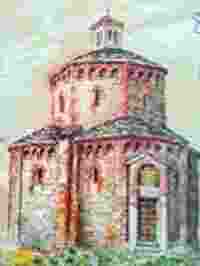Purgatory

Biography
Alphonso Mary De' Liguori, writer, poet, musician, bishop, doctor of the Church and patron of the moralists, was born in Marianella, near Naples, on 27th September 1696.
Join us
Biographical notes: 1696 - 1787
It was the first of the eight children of Joseph De' Liguori and Ann Mary Catherine Cavalieri.
He started to study very soon; he could speak Tuscan language, Latin, Greek, French and Spanish. He learned philosophy (including mathematical sciences), horse riding, fencing, music, drawing, painting and even architecture. At the age of 12 years Alphonso had ended his secondary school and had entered the faculty of jurisprudence of Naples.
In 1715 he entered the Confraternity of the Doctors and looked after the poorest ill people in the hospital of Naples, Santa Maria del Popolo, which was said home for incurables.
Alphonso had been a lawyer of great success for tenth years; then he chose the sacerdotal life.
On 27th August 1723 in front of the image of Our Lady he promised to devote himself exclusively to God and to the people in need and to become priest. When he was 30 years old, on 21 December 1726, he was ordered priest.
He worked immediately full time in the diocese of Naples for the people living in the mountains and in the country sharing their difficulties.
In the summer of 1730 in Scala, a little town near Salerno, talking with sister Mary Celestial Crostarosa, Saint Alphonso was convinced that he had been called by God to found a congregation of clergymen and laymen for the evangelisation and the salvation of the poor.
The official and solemn birth of the Congregation of the most Holy Redeemer happened in Scala on 9th November 1732. It was approved, together to the rule, by Benedict XIV on 25th February 1749.
As writer Saint Alphonso was very popular. It published 111 works like the Visits to the most Holy Sacrament, the eternal Principles, and the Practice of loving Jesus Christ. The best work is the Glories of Mary with thousand of editions starting from 1750.
He was not only writer and painter but he was also a good musician. His most famous song is: You come down from the stars. It is a Christmas song which he wrote in 1755 preaching in a mission.
He was named bishop by Pope Clement XIII on 9 March 1762. The ordination took place on 20th June in the church of Santa Maria sopra Minerva. As bishop beside the poor people he looked after the seminarists, in which he saw the saving action of Christ.
In 1772 Saint Alphonso asked the new elected Pope Clement XIV to dismiss him from bishop because of his age and the cervical arthrosis which had crippled him. In 1775 Pious VI could no longer avoid to accept the renunciation because the Saint was blind and deaf, overwhelmed by diseases. On 1st August 1787 he died serenely.
